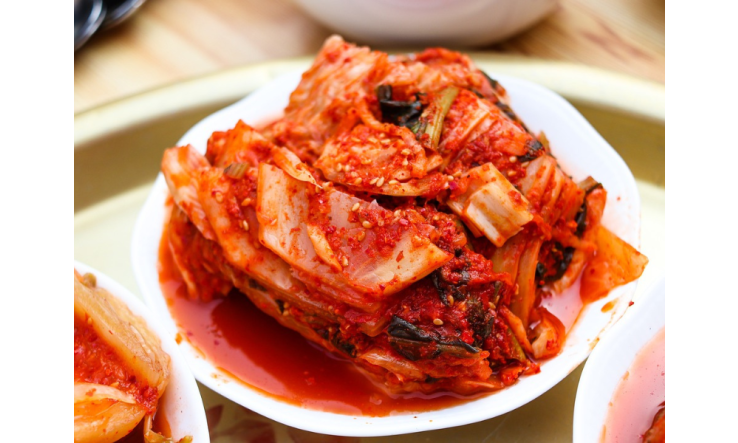Kimchi is a traditional Korean sour dish, often made from cabbage and other vegetables; it is now very popular in the Western world due to its taste and many benefits.
Although only a limited number of clinical studies on fermented foods have been conducted, there is evidence that these foods offer health benefits far beyond the starting food materials. 1
It is a fermented food (a number of bacteria are involved in kimchi fermentation, but probiotic lactic acid bacteria are the dominant species in the fermentation process; they are among the most studied microorganisms). A friend of the gut microbiota, its nutritional and nutraceutical potential gives it several other health benefits:
- Anti-obesity, anti-constipation, cholesterol-lowering, antioxidant, anti-inflammatory (which accelerates, among other things, the aging process), for the promotion of brain, colorectal, immune and skin health. 2-8
- Nutrient-dense (A significant source of vitamins, such as vitamins A, C, and K, at least 10 different minerals, more than 34 amino acids, and dietary fiber). 9
Also, there are compounds called biologically active peptides, produced by the bacteria responsible for fermentation, which are also well known for their health benefits. Among these peptides: 10
- Conjugated linoleic acids have a hypotensive effect.
- Exopolysaccharides have prebiotic properties.
- Bacteriocins exhibit antimicrobial effects.
- Sphingolipids have antimicrobial properties.
- Bioactive peptides exhibit antioxidant, antimicrobial, opioid antagonist, antiallergenic and hypotensive effects.
What a great idea to incorporate kimchi into our menu, it is full of benefits and so tasty!
References:
1. Marco ML, Heeney D, Binda S, Cifelli CJ, Cotter PD, Foligné B, Gänzle M, Kort R, Pasin G, Pihlanto A, Smid EJ, Hutkins R. Health benefits of fermented foods: microbiota and beyond. Curr Opin Biotechnol. 2017 Apr; 44:94-102. doi: 10.1016/j.copbio.2016.11.010. Epub 2016 Dec 18. PMID: 27998788.
2. Hong SW, Choi YJ, Lee HW, Yang JH, Lee MA. Microbial Community Structure of Korean Cabbage Kimchi and Ingredients with Denaturing Gradient Gel Electrophoresis. J Microbiol Biotechnol. 2016 Jun 28;26(6):1057-62. doi:10.4014/jmb.1512.12035. PMID: 26907755.
3. Park KY, Jeong JK, Lee YE, Daily JW 3rd. Health benefits of kimchi (Korean fermented vegetables) as a probiotic food. J Med Food. 2014 Jan;17(1):6-20. doi: 10.1089/jmf.2013.3083. PMID: 24456350.
4. JK, Das G, Paramithiotis S, Shin HS. Kimchi and Other Widely Consumed Traditional Fermented Foods of Korea: A Review. Front Microbiol. 2016 Sep 28;7:1493. doi: 10.3389/fmicb.2016.01493. PMID: 27733844; PMCID: PMC5039233.
5. Kok CR, Hutkins R. Yogurt and other fermented foods as sources of health-promoting bacteria. Nutr Rev. 2018 Dec 1;76(Suppl 1):4-15. doi: 10.1093/nutrit/nuy056. PMID: 30452699.
6. Kim HJ, Noh JS, Song YO. Beneficial Effects of Kimchi, a Korean Fermented Vegetable Food, on Pathophysiological Factors Related to Atherosclerosis. J Med Food. 2018 Feb;21(2):127-135. doi: 10.1089/jmf.2017.3946. Epub 2017 Dec 22. PMID: 29271694.
7. An SY, Lee MS, Jeon JY, Ha ES, Kim TH, Yoon JY, Ok CO, Lee HK, Hwang WS, Choe SJ, Han SJ, Kim HJ, Kim DJ, Lee KW. Beneficial effects of fresh and fermented kimchi in prediabetic individuals. Ann Nutr Metab. 2013;63(1-2):111-9. doi:10.1159/000353583. Epub 2013 Aug 17. PMID: 23969321.
8. Woo M, Kim M, Noh JS, Park CH, Song YO. Preventative activity of kimchi on high cholesterol diet-induced hepatic damage through regulation of lipid metabolism in LDL receptor knockout mice. Food Sci Biotechnol. 2017 Dec 12;27(1):211-218. doi:10.1007/s10068-017-0202-3. PMID: 30263742; PMCID: PMC6049760.
9. Cheigh HS, Park KY. Biochemical, microbiological, and nutritional aspects of kimchi (Korean fermented vegetable products). Crit Rev Food Sci Nutr. 1994;34(2):175-203. doi:10.1080/10408399409527656. PMID: 8011144.
10. Şanlier N, Gökcen BB, Sezgin AC. Health benefits of fermented foods. Crit Rev Food Sci Nutr. 2019;59(3):506-527. doi:10.1080/10408398.2017.1383355. Epub 2017 Oct 20. PMID: 28945458.
Maison Jacynthe disclaims all liability. All information contained on this page is not intended to replace justified allopathic treatment or to disregard the expertise of the medical profession. It is up to each individual to take charge of their own health, to inform themselves, and to make the necessary changes to improve their condition. Therapeutic supervision by a qualified health professional is obviously recommended.





































































Leave a comment